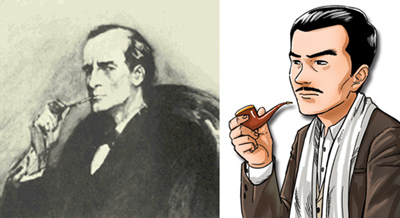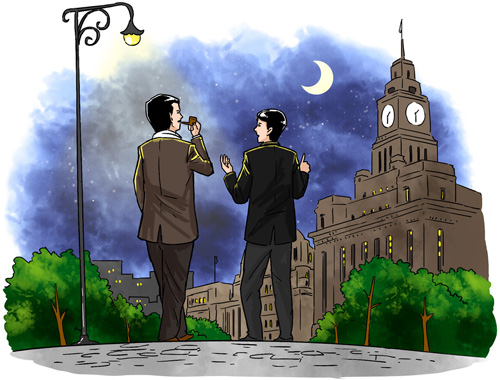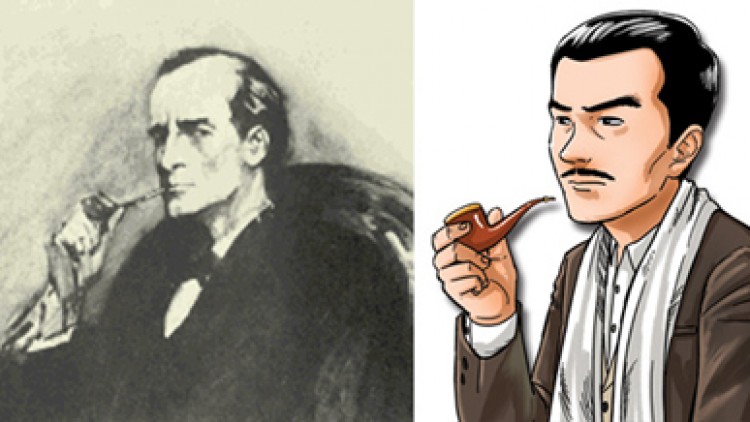Adapting our first Sherlock Holmes novel was a lot of fun. From the very beginning of Mandarin Companion, I had my heart set on creating a Sherlock Holmes adaptation. Our first challenge was picking the right story which would be easy to adapt. Not every story can be simplified using only 300 characters. The setting, characters, and plot has to be just right for us to make an adaption that will be easy to read for elementary-level Chinese learners while still remaining faithful to the original story. After reading “The Red-Headed League”, voted as the #2 favorite among all Sherlock Holmes short stories, I saw this story had all the right elements but the trick was how to do it.

The first task was to localize the name Sherlock Holmes. His commonly known Chinese name is a transliteration nightmare. Get a mouthful of this: 歇洛克·福尔摩斯 (Xiēluòkè Fú’ěrmósī). After going through a lot of ideas, we settled on 高明. It is easy to say, contains easy characters, and literally translated means “brilliant”. Our illustrator did an excellent job depicting what we envisioned a Chinese Sherlock Holmes would look like. Thus 高明 was born.

However, an obvious challenge is that China is practically devoid of anyone with red hair. The genetic standard in China is jet-black hair, only challenged today by hair salons offering every type of hair coloration imaginable. Thankfully, John’s clever wife came up with the idea of a “Curly-Haired” League. In China, curly haired people are about as uncommon as redheads are in the West.
Next problem is that China doesn’t really have anything comparable to a “league.” The only organizations of that nature would be government-sanctioned and it’s not something that people could just start up on a whim. Plus the closest word to “league” is 协会, which has a non-beginner-friendly character, 协, and is usually used to denote government associations. An individual could, however, start up a company and give it just about any name they would want, thus “The Red-Headed League” became “The Curly-Haired Company”.
Working with the illustrator was a lot of fun. We figured 1920’s to 1930’s Shanghai would best mirror the late 1800 London Sherlock Holmes period. The architecture of Shanghai in the early 1900’s is still largely intact today, most visibly on the “Bund” along the banks of the Huangpu river. We selected classic iconic buildings where the story was to take place, and SHAZZAM, we had our story.

We worked with the writer to come up with new names for each character. John and I were excited when we got back the first draft and read through it. As I read, I came across a section that just didn’t seem to match my recollections of the original story.
In the original version, Mr. Wilson (谢先生 in the graded reader), who has fiery-red hair, is admitted into The Red-Headed league and offered a part-time job. It required him to leave his shop in the care of his assistant for short periods every afternoon and copy down the text from an encyclopedia. Even stranger, the league was paying him a generous sum of money at the end of each week. After eight weeks, he found a note on the door declaring the Red-Headed league had been dissolved. Although he had earned a good sum of money, Mr. Wilson was very upset about not being paid for the last week he had worked and for the loss of future income.
In our Chinese version, the terms of this agreement had changed. 谢先生 (Mr. Wilson) was to be paid at the end of every month, however at the end of four weeks, the Curly Haired Company (Red-Headed League) was dissolved without him being paid anything.
It seemed a bit odd to me. Why did they change this part of the story? I worried that we’d get hate-mail from Chinese-reading Sherlockian-purists. Regardless, I felt we should follow the original story as closely as possible. I didn’t see any reason for this to be changed. We asked our writer and the conversation went something like this:
Writer: They are bad guys. Why would they waste any money paying him? If they are crooks then they will certainly try to cheat him without paying him any money. That’s what they would do in China.
Us: Well, if they are up to something, then they want to make it look as plausible as possible, therefore they won’t cheat him just like that to save a bit of money. Besides, he’s supposed to get paid every week, not every month.
Writer: But in China, nobody gets paid every week. That’s just strange. People might not take a job just because you say you’re going to pay them every week. It’s so unusual that people would think somehow you are trying to trick them. These guys are not honest and they’re going to try and cheat him out of any money they can.
Us: We understand that may be the Chinese perspective on this story, but this is Sherlock Holmes and it’s different. These are smart crooks.
Writer: But this story is adapted to China and that’s how Chinese would do it.
The conversation went back and fort till we settled on a compromise; 谢先生 would get paid at the end of the month and receive two full month’s salary before the company closes down. So we’ve localized the payment terms to China while the essence of the story holds true to the original plot. Another case solved!

“Elementary, my dear Watson”
To see samples of this story or get your own copy, visit the book page.

One reply on ““Elementary My Dear Watson”: How We Adapted a Classic to Chinese”
I disagree a bit. The nature of the job is soooooo strange that it makes sense for anyone who values their time to ask for this kind of payment. Secondly, the crooks could not afford to have someone get itchy feet at the end of a week and walk out. In fact, the work is soooooo strange that I am surprised he did not ask to be paid on a daily basis. And if you think there are no jobs available in China that get paid on a daily basis— look again.